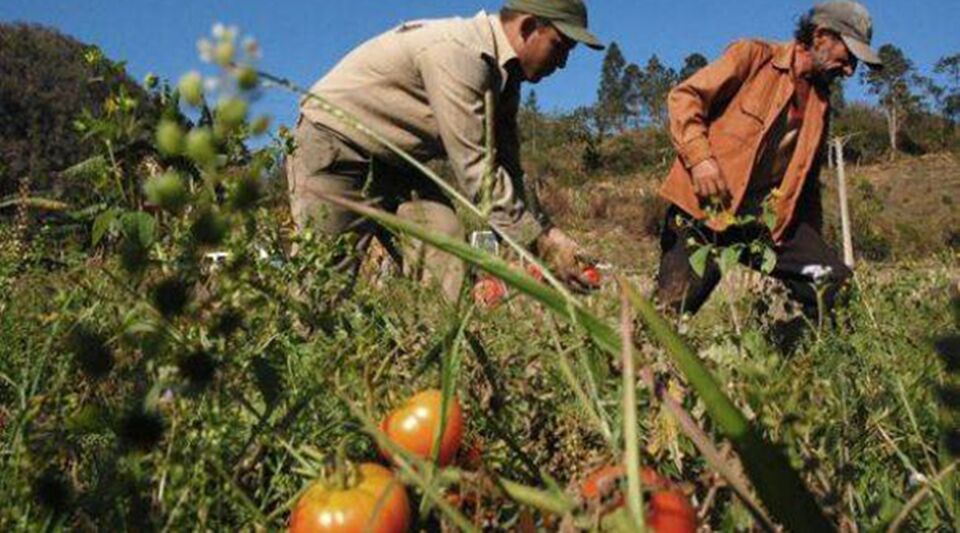The collapse of the tomato industry in Ciego de Ávila can be summed up in two figures. Between 2010 and 2023, the plantation areas have doubled, but the harvest has fallen by a fifth, going from 21.8 tons per hectare to 4.1 in 2022. The data is so eloquent that the provincial newspaper, Invadertitle the note in which he shells them ground (de)tomato.
“If we ‘transplanted’ the results of more than a decade ago to the areas of last year, we would have been able to harvest five times more tomatoes,” says Pedro Manuel Díaz González, product specialist at the Provincial Delegation of Agriculture, who recites the data. of the decline from the record of 2013, when it reached 22.5 tons per hectare.
According to the text, the official had to go to the municipality of Mamonal – where, despite everything, half of the tomatoes that are processed were planted – to ask the producers to plant “at their own risk” since there was “zero ” fertilizers and chemicals.
“Do you think that with no products and almost no oil, or at 2,000 pesos for a 20-liter jug, contraband, you can demand that they plant large tracts and then take them to the industry?”
As expected, it was not possible, and the planting plan was only 69% fulfilled, 2,499.5 hectares of which 948 will go to the industry. The figure, he explains, is not even half of what was processed a year earlier, 2,285 hectares.
For Díaz González it is logical that the result is what it is. “Do you think that with no products and almost no oil, or 2,000 pesos for a 20-liter jug, contraband, it can be demanded that they plant large areas and then take them to the industry?” He blurts out.
The disastrous data continues. In 2022, 5,184 tons were ground in the Majagua and Florencia factories, while by 2023 it is expected to achieve half, with the aggravating circumstance that only 1,700 tons will be from Ciego de Avila and 700 will have to be received from Jatibonico and Yaguajay, in Sancti Spíritus.
For example, a button: the Majagua factory ground 11,000 tons of tomatoes in 2013 and, after receiving an economic injection from China that made it possible to repair machinery and carts, among other things, it has gone to 2,400 tons in 2023, if the forecasts are met.
At the Ceballos Agroindustrial, former jewel in the crown of the food industry and today turned into a mass with losses, its director, Enier González Suárez, places the processed tons at only 90. The plant has gone from not being able to crush the tomato that came to it seven years ago to “swallowing” everything harvested in January and February in one day. The expectations could not be more gloomy, since they calculate that, once the harvest is over, they will barely reach 1,600 tons, little more than what was done before in a single month.
“The peasants did not want to take risks,” says the Ceballos manager, who points out that the producers have planted 176 hectares, just over half of what they had agreed to. “We paid more than 170,000 in freely convertible currency (MLC) – he says, referring to the incentive provided to stimulate the most compliant producers – which did not have inputs to buy”, he maintains.
In October, he adds optimistically, Ceballos will open a “consignment” store where the peasants will be able to purchase, in foreign currency, inputs that will be sold by foreign companies.
According to the note of Invaderthe entity pays 730 pesos per quintal of tomato and 60 MLC per ton, but in Majagua they maintain that there is no MLC.
“We paid more than 170,000 in freely convertible currency (MLC) -he says in reference to the incentive planned to stimulate the most compliant producers- which there were no inputs to buy”
“Only if you complied with what was agreed in the plan, they paid you 397 pesos per quintal and the ton meant, in MLC, 40% of that equivalent value,” says Vicente Echemendía Rodríguez, a specialist in Various Crops at that factory, where 1,000 are supposedly paid. , “about 65 MLC per ton for those who comply with the previous harvest.”
Díaz González attributes the situation more than to the problems to pay in foreign currency, to inflation. “Before, people had a way to sow at least part of the resources. They assumed the risk. Now everything has become too expensive and they cannot afford to lose,” he sums up.
The only one that is saved from the situation is the company from Baraguá, where the cachaça applied two years ago has given good results, with 70 tons per hectare.
The lack of tomato is perceived on Cuban tables, also fueled by the ceiling on prices. At the end of last year, a vendor told this newspaper that surveillance of the product in the Havana markets was very close. “They have told us that we cannot sell it for more than 200 pesos a pound and that amount does not give us business,” said the merchant.
In December 2022, Cienfuegos decided to control the price in a maximum of 25 pesos and Villa Clara did the same last weekleaving it at 42.
________________________
Collaborate with our work:
The team of 14ymedio He is committed to doing serious journalism that reflects the reality of deep Cuba. Thank you for accompanying us on this long road. We invite you to continue supporting us, but this time becoming a member of our newspaper. Together we can continue transforming journalism in Cuba.


















